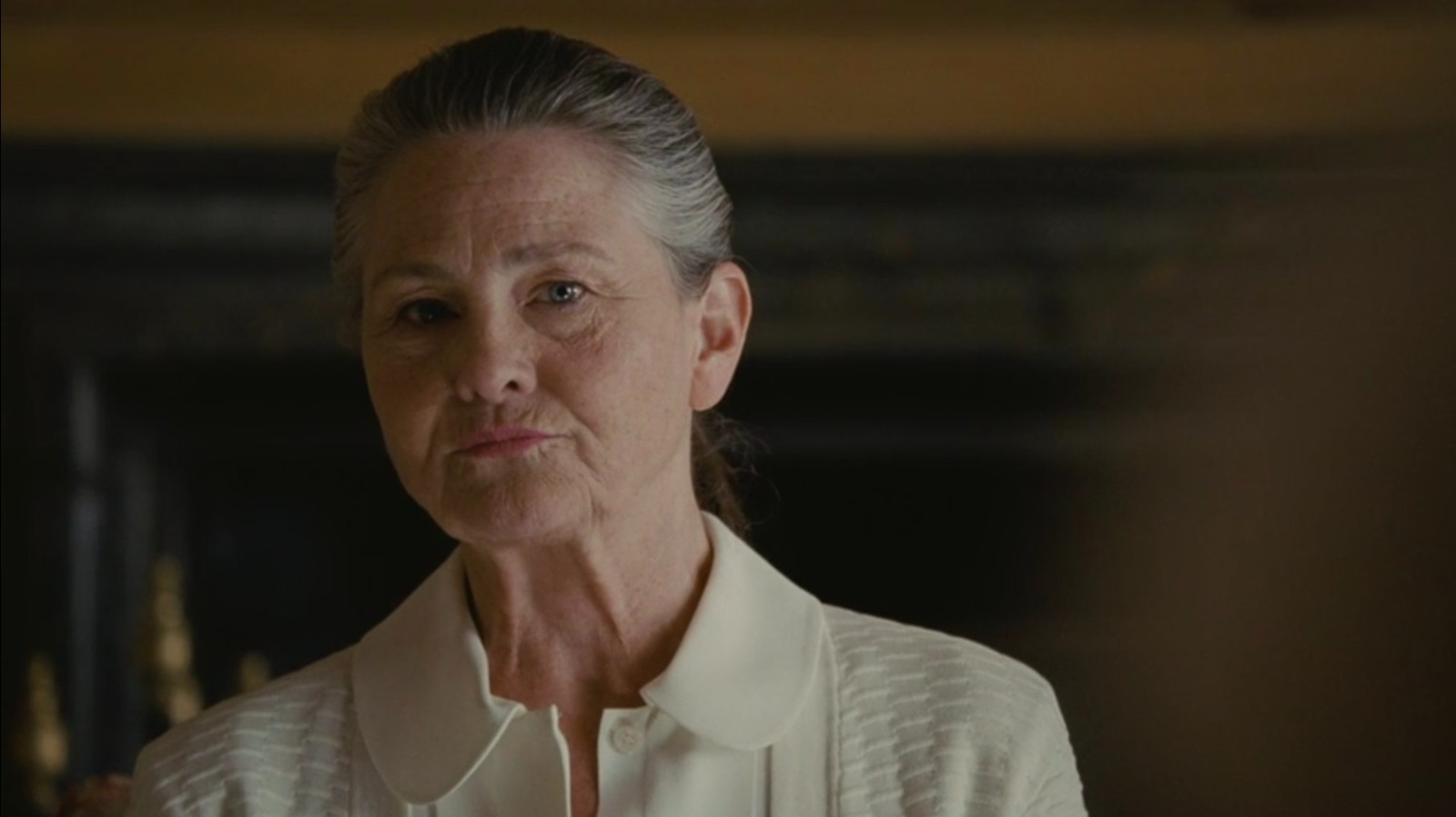
Succession Is Full Of Horrible Rich People, But Nan Pierce Is The Worst – /Film
This post contains spoilers for the season 4 premiere of “Succession.”
Four seasons into its fantastic HBO run, it can be easy to forget that Jesse Armstrong’s “Succession” is satire. It makes fun of the wealthy sad boy sons and cruel corporate titans at its center, sure, but the drama also has a strong emotional core that keeps viewers attached to even its most horrifying characters. By this point, watercooler discussions about who your favorite Roy sibling is include an unspoken acknowledgement that each of these people is surely responsible for human rights violations in one way or another — not to mention the manslaughter, cover-ups, witness intimidation, and harassment that we’ve see on screen.
“Succession” manages to reel us into the world of the rich and horrible by creating a moral baseline for its characters that’s lower than low, all while weaving a tangled psychological web that makes them intermittently sympathetic regardless. But every once in a while, a character like Nan Pierce (Cherry Jones) shows up and reminds us that the wealthy aren’t just capable of being funny-evil or puppy-dog-eyes-evil, but something much more obnoxious: fake-working-class-solidarity-evil.
A master class in fake humility
 Peter Kramer/HBO
Peter Kramer/HBO
Several characters in “Succession” perform faux class consciousness, including theoretically left-leaning Shiv (Sarah Snook) and Kendall (Jeremy Strong) during his rebellious phase. Nobody puts on a show about it quite like Cherry Jones as Nan, though. We first meet Nan, the head of Pierce Global Media, when the Roys consider acquiring the more old-fashioned media brand in season 2. The Roy family arrives at the Pierce family’s sprawling, rural estate by helicopter, and though the manor has its own name (Tern Haven), a last-supper-sized dining table, and a floor plan that would put some of the royal family’s properties to shame, Nan immediately gets to work pretending it’s not ostentatious.
“Welcome, you, to our funny little house,” the businesswoman says before telling an anecdote about how the drink they’re all toasting came from a recipe “from the wallet of Teddy Roosevelt’s valet.” Later on, at dinner, we see a full kitchen staff slaving over the night’s meal, one woman literally wiping her brow, before Nan swoops in to grab the cooked turkey out of her hands and present it as homemade. She does a small curtsy when she brings the main course to the table and everyone applauds.
While the Roy family either flaunts their wealth or treats it as a given, Nan clearly comes from the Martha Stewart school of elegant, aesthetics-focused, faux-relatable classiness. Unfortunately, she’s also probably the type to not see the issue with keeping a personal staff of 30 people quarantined with her the way that Stewart reportedly did during COVID-19 lockdown. Nan Pierce never gets her hands dirty, but it seems very important to her that she appear to others as if she did. She often acts as if her multi-billion-dollar company is a bespoke, family-run small business.
‘Money is a social construct’
 Peter Kramer/HBO
Peter Kramer/HBO
The same hypocrisy holds true for Nan’s business. She’s a shrewd negotiator, as we see in the premiere, but she also upholds an illusion of home-grown values that contrasts with the Roy family’s disarray — and her own grotesque wealth. When she gets down to brass tacks with Logan (Brian Cox) in season 2, she claims that the Berlin Wall wouldn’t have come down without the help of Pierce journalists. “Money is a social construct, whereas virtue and integrity, these things actually exist,” she says in another scene, to which Tom (Matthew Macfadyen) jokingly responds that he paid for some ham at the grocery store with his concern about the environment. Eventually, Nan pulls out of the deal in light of the Waystar Royco cover-up, but she’s back at the bargaining table in season 4, waving away Shiv’s mentions of virtue in favor of coded talk about how to get her the best deal.
Everyone in “Succession” is self-important and pretentious and out of touch, so why is Nan’s brand of ostentatiousness so much more perfectly irksome than anyone else’s? In part, it’s thanks to Cherry’s excellent performance, which is shot through with a layer of fake humility that’s as slyly funny as it is maddening. In the new season, Nan returns more performatively distraught over the very existence of money than ever. After joking that the people in charge of upkeep on her new home “shred hundred dollar notes for fertilizer,” Nan offers the Roy siblings high-end wine. “They may as well be jars of jam to me, but the connoisseurs seem to like them,” Nan says. With each line, she aims to separate herself from the wealthy, attempting to cultivate an everywoman air that’s outright hilarious when keeping in mind the ten billion dollar deal on the table.
Nan’s performative disgust is hilarious and obnoxious
 HBO
HBO
No matter how hard Nan tries to pretend she has “peasant taste” and no sense of money, she’s very clearly wheeling and dealing throughout this episode. From her well-timed headache to her insistence that she doesn’t want to talk numbers, Nan’s well-manicured Home & Country facade is clearly colliding with the fact that she is a billionaire with billionaire problems. “I don’t like this,” she says when Kendall suggests they lay their bid on the table. “It makes me feel like I’m in a bidding war! Horrible!” The over-the-top responses tip into sheer hilarity when Shiv later offers her 8 billion dollars, to which she responds emphatically, “This is disgusting … but thank you.”
In some ways, the version of Nan we see in season 4 is a more on-the-nose parody of wealth than Armstrong’s show usually presents. Her ridiculous, theatrical cognitive dissonance calls to mind other recent skewerings of the elite that are more blunt than sharp, like Mark Mylod’s “The Menu” or Jamie Lee Curtis’ character in “Knives Out.” But as eccentric as the way she wears (and denies) her wealth may seem, she certainly feels like a real person to me.
Her denial of her own privilege rings true
 HBO
HBO
I grew up in a working class family, but when given the opportunity to attend college on scholarships and grants, I ended up in a sleepy town that typically ranks around fifth place in lists of the richest cities in California. There, I not only found out about the Nan Pierces of the world, but ran into them every day. When clients at the pilates studio where I worked weren’t advising me to buy a Hawaiian time share with the $600 in my bank account, local moms were trying to hire me to stand at their front door on Halloween and hand out candy while they had parties feet away from me. Every surreal, laughable situation was made more infuriating by the fact that each of the Nans I met seemed certain that, economically, they were just like me — because money is just a construct, right?
“Succession” makes a mockery of the 1% in many ways, but it also humanizes its central characters. Armstrong and the rest of the show’s writers are too talented to tell a tale like this without making us care about the people involved. But with a guest character like Nan, the series is able to create a portrait of blatant denial of privilege that’s entirely unsympathetic — and deeply entertaining. Cherry commits to the role as Nan herself puts on the performance of her life, furiously waving away mentions of her multi-billion-dollar-dynasty to instead talk about the crappy wine she liked as a teenager. Everyone in “Succession” sucks, but there are few characters we love hating as much as Nan Pierce.
“Succession” airs on HBO and HBO Max on Sundays at 9 PM EST/8 PM CST.










































































